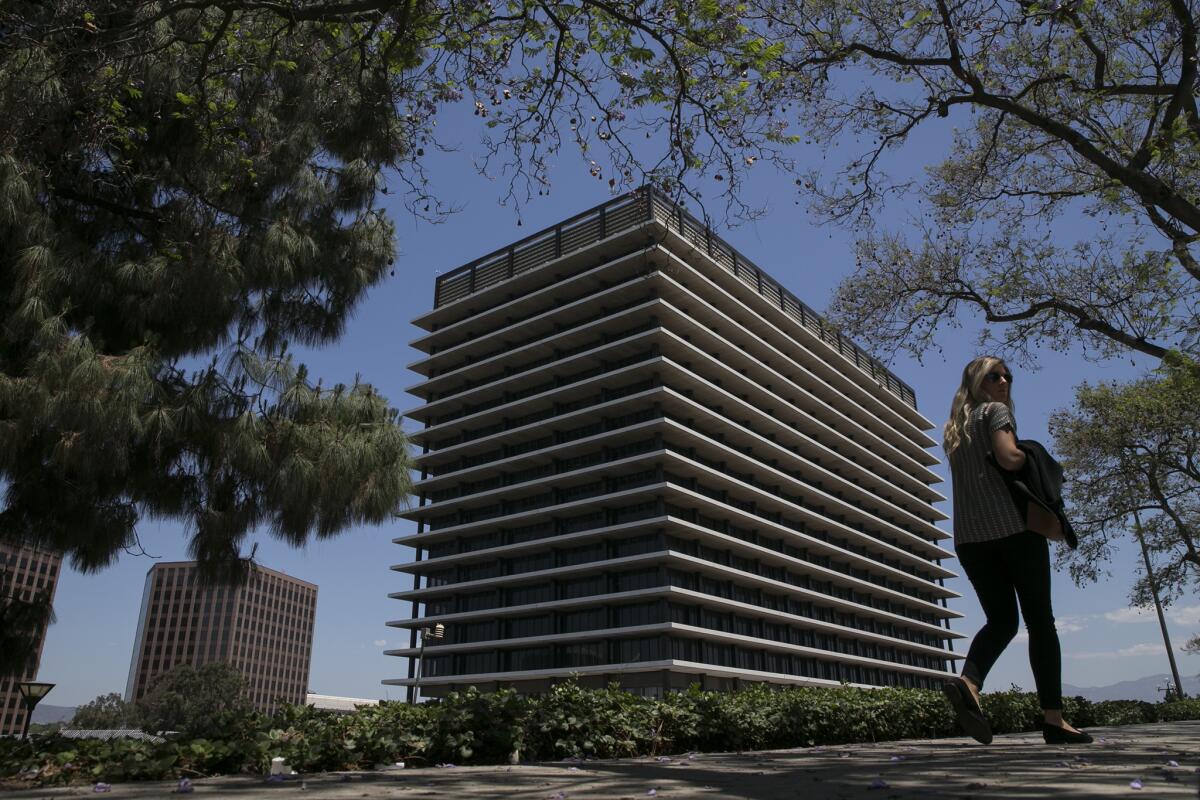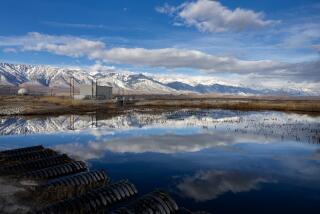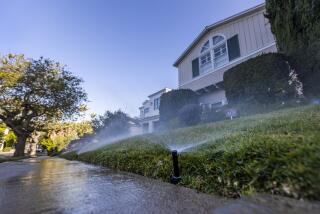Twice-a-week watering limit could be next for L.A.

The Los Angeles Board of Water and Power Commissioners has cleared the way for the city to impose stricter limts on outdoor watering, if conservation efforts fall short. Above, DWP headquarters in downtown Los Angeles.
During four years of drought, Los Angeles residents have conserved water so diligently that even the most skeptical experts have been taken by surprise.
The savings have been significant enough to head off the draconian restrictions â water rationing, mandatory pool covers, big fines for wasters â that other cities have resorted to.
But Los Angeles Department of Water and Power officials got a scare when they analyzed the cityâs June water use data. L.A. barely met the mandatory 16% reduction required by the state, avoiding the penalties that now come with noncompliance.
So Tuesday, the Board of Water and Power Commissioners took out some insurance, voting to recommend that the City Council consider moving to Phase III from Phase II of its emergency water conservation plan if L.A. fails to meet state and local targets. The stricter rules would cut sprinkler use to two days a week from three, among other measures.
Water officials say they hope it wonât come to that. But Tuesdayâs board action will allow the council to push for savings more quickly if conservation comes up short.
âPerhaps we congratulated ourselves a little too early,â said Conner Everts, facilitator of Santa Monica-based Environmental Water Caucus, a coalition of environmental and recreation groups that promotes sustainable water management. âWeâve gotten credit for what weâve done in the past, and now we have to adapt to what we have to do now.â
Though the current drought began a few years ago, Los Angeles residents have been reducing water consumption for years â often at rates higher than their Northern California counterparts.
But since last fall, L.A.âs conservation efforts have been prodded by mandates from Mayor Eric Garcetti and Gov. Jerry Brown.
In an executive order last October, Garcetti called for a 20% reduction in per capita water use by 2017, using 2014 totals as a baseline. Last week, his office said the city was on track to meet that target.
Earlier this year, Brown ordered a 25% reduction in urban water use statewide. To meet that demand, some water districts with a history of heavy water usage were told to cut consumption 36%. Los Angeles was rewarded for past efforts and given a target of just 16%.
Although June was a close call, Marty Adams, a DWP senior assistant general manager, said the department is about 1 to 2 percentage points ahead of where it needs to be so far in July. But he cautioned that after a week of unusual rain, temperatures could rise again and water use could increase.
âWe always thought the summertime would be the real test,â he said in an interview. âIâm sure we canât run a few hundred acre-feet over every month and claim everything is fine.... We know weâre right on the razorâs edge.â
The DWP boardâs action was a first step. Any changes to the cityâs watering regulations would require City Council approval.
So far, residents have been doing a good job conserving water amid a fourth year of drought, officials said. The soonest customers could see tighter restrictions would be sometime next month.
Under the cityâs current Phase II restrictions, Angelenos may run their sprinklers only three days a week. (Drip irrigation and hand-held hose watering are subject to lesser restrictions.) The rules also restrict water users from hosing down sidewalks or driveways, watering in a way that causes runoff or washing cars with a hose that does not have a shut-off valve.
If the city were to move into Phase III, outdoor landscape irrigation would be limited to two days per week. In that stage, officials also recommend using pool covers to decrease evaporation and using commercial car washes rather than hosing down vehicles at home. Those recommendations would not become mandatory until Phase IV.
Other cities across the Southland have already imposed two-day-a-week watering.
Long Beach, Glendale and Pasadena have all recently moved to that schedule. Officials in all three cities said the water conservation targets set by the state spurred the stricter rules.
âI donât think weâd be able to comply with the [state-mandated] 16% if we hadnât done it,â said Kevin Wattier, general manager of Long Beach Water Department. âWe saw a big increase in conservation when we went to the two-day.â
Experts praised the DWPâs preemptive move as prudent public policy that can help edge up conservation during the time of year when it will be toughest to save.
âThe department is doing it right,â said Jonathan Parfrey, a former DWP commissioner and executive director of Climate Resolve, a nonprofit that focuses on how L.A. can adapt to climate change.
A conservation plan, Parfrey added, is âsupposed to be smart and incremental, and itâs supposed to send a strong signal, and I think the right thing to do is to reduce our watering to two days a week.â
H. David Nahai, former head of the DWP, said he has âevery confidenceâ Angelenos will be able to make the transition, if necessary. After all, they were told to water only two days per week as recently as 2009 â during the last drought.
âThis is a statement by the commissioners that the city of Los Angeles will not fail,â Nahai said. âNobody can point the finger at us and say we failed to meet conservation goals. This is about more than saving water, this is a matter of pride.â
Hoy: LĂŠa esta historia en espaĂąol
Twitter: @taygoldenstein
Twitter: @bymattstevens
More to Read
Sign up for Essential California
The most important California stories and recommendations in your inbox every morning.
You may occasionally receive promotional content from the Los Angeles Times.












